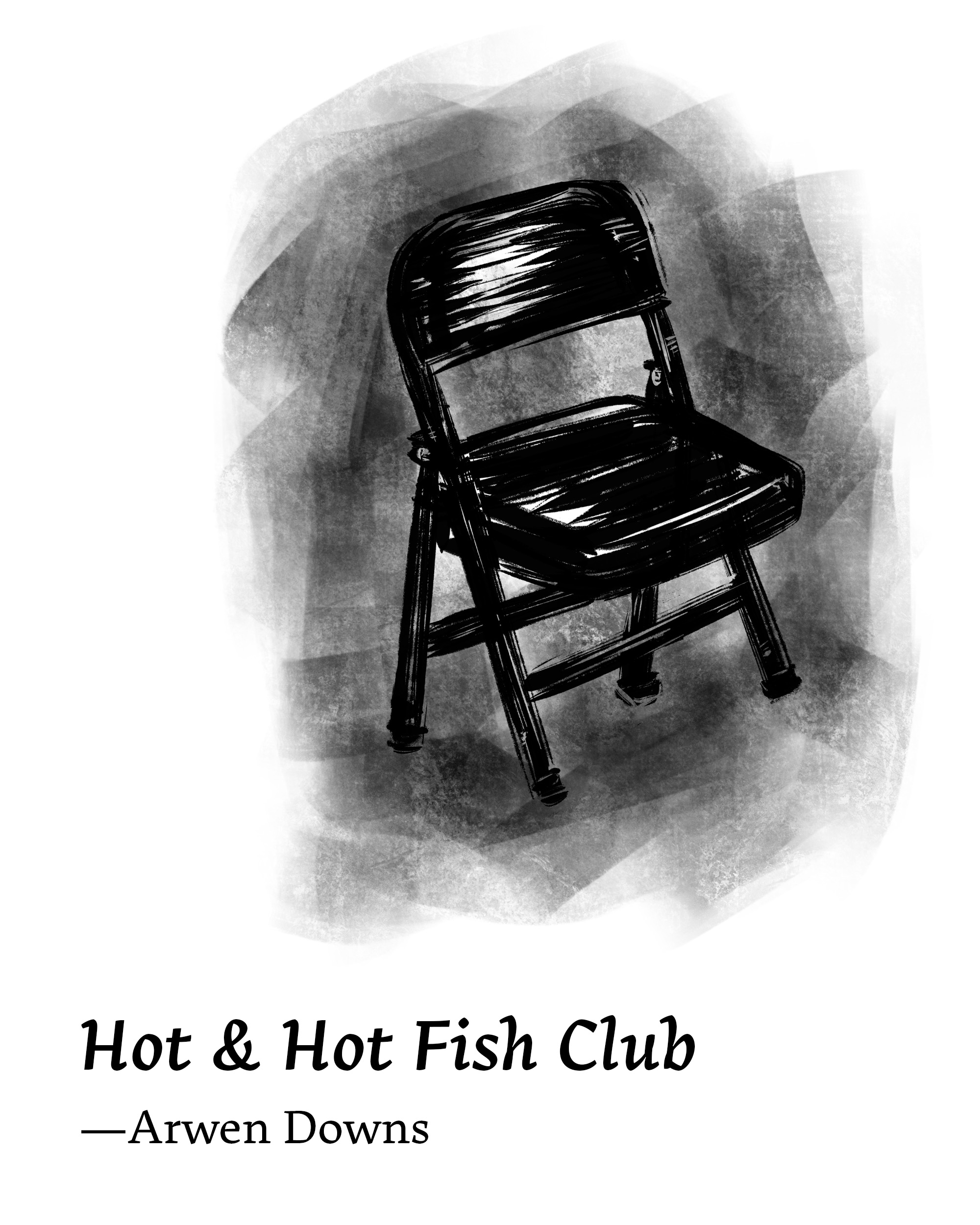Hot & Hot Fish Club

I’ve never heard anything like it, and it sounds like a typo – but I’ll never forget it. Sanitation rating 71. Two points lower and the Health Department would be forced to shut it down – and those two points are widely considered to be the result of the fish plates delivered to the Health Inspector (who labors under the belief that deep-frying is a form of sanitization) every Friday (and even if the precaution of deep-frying was not taken, how could one get sick from fish on Friday? That’s like catching a cold from communion wafers).
The corners of the restaurant are dimly lit and blackened with grime, softening the edges of the room. In the lone booth, two barely-women drink from a shared styrofoam cup half-filled with old, burnt coffee. One has blonde hair, one has black hair, but they are so alike in their movements and their speech that few people can tell them apart. It doesn’t matter to them – they count off sips, one for you, one for me, two for you, two for me – a mantra of sharing equally. The screen door, lightweight and ill-hung, closes on the back of a young man carrying two tubs of freshly-caught fish. He does not need to cross the threshold completely to reach the milk crates on which he daily places his haul, and the door slams behind him when he steps outside, back into the sunlight.
Wet dishcloths are tacked over the open windows, cooling the occasional cross-breeze.
Fish and rice is very nice – a plate costs $3.50, and those who know ask for the “hot and hot”the better fish, the fresher fish, the fish the cook prefers – the origin of the phrase long-forgotten. The rice of the rhyme is long-forgotten as well, replaced with french fries or hushpuppies (and instead of or for an extra fifty cents). The sticky heat signals the arrival of summer and sweet corn, so Frogmore stew is also offered, heaped on paper plates that sag under the weight.
There is a folding chair inside, either occupied by the cook or collapsed against the back wall, nothing else, so warped picnic tables out back serve as seating, and strangers sit elbow-to-elbow, and (usually) tablemates politely step away for a postprandial smoke. Usually. A picket fence encircles the patch of sandy soil on which the tables sit, and a scrubby pine tree next to the door has miraculously survived drought and neglect and regular assaults from Southern pine beetles.
Even the older patrons could not remember the cook ever being young. Maybe he had sprung, fully-grown, from his father’s head. But he was getting paler – unlike others in the neighborhood, the sun did not weather him, rather, it seemed to bleach him out. Like an old tee-shirt on the line, he was faded.
One of the young women in the booth goes to the counter – they have pooled their crumpled dollars for coffee and now a hot and hot, both to share – the cook of course serves up more than a regular plate, sympathetic to youth and scraping by and being denied access to the purported delights of young adulthood by dint of income and a poor understanding of the intricacies of social mores. The vitality of the two women is ostentatiously presented in their heat-flushed faces and glistening bodies (horses sweat, men perspire, and ladies glow), and their booth tete-a-tete has a lambent quality – flickering motions and muted glow. It pleases the cook that there is so much concentrated life in the otherwise-still room.
The heat creates a stillness in the same way a blizzard muffles a landscape –
The restaurant is open from 10:00 in the morning until the fish runs out for the day, hours dependent on the morning catch of a handful of early-rising, enterprising anglers who will spend the day doing other jobs that demand skill or hard work but do not reward it in kind. Each week they are paid the same amount for their haul, regardless of weight or count – an arrangement that cynics believe will be taken advantage of, underestimating the loyalty that steady income can inspire. The cook knows the inhabitants of the booth will remain in the coveted spot until he locks up – it is a known refuge for those looking for a place out of the sun that burns their skin and saps their energy, away from crowded homes on a sole day off of work, away from the suspicious gaze of salespeople in luxuriously air-conditioned stores. No one has ever been asked to leave the booth because the meal is long-finished. The cook does require booth residents to buy at least one plate between them, although there has been more than one occasion when the payment has serendipitously returned itself to the pocket of the buyer.
Out back, the noontime crowd cast shadows directly onto the plates they lean over, none thinking of the sun and the heat and the increasingly dry and inhospitable summers. A sweating vat of ice water contains the only beverage offered, and thick melamine mugs – the kind most often associated with hospitals and elementary schools – are stacked on a narrow shelf inside after being used, and are washed by hand in the “hand wash only” sink each night (sanitation grade: 71).
The door weakly creaks shut behind a man whom the cook has never seen. He is familiar and foreign at the same time – like an acquaintance whom you only remember from an old photo that you feel bad throwing out, but only come across when moving house (what if cameras really do steal souls and I throw away a picture? Is the subject doomed to eternal purgatory, or is the soul freed?). The women in the booth look up, taking in the new customer with matching disinterested looks before resuming the slow process of picking the last traces of salt off their plate, licking their fingertips and dabbing them in the fluted edges, mouthing numbers as they absentmindedly count each grain. The man is unsteady, but when he sees the cook, there is a change – he glances back at the women, then he stands up straighter, and his eyes shine.
The man talks instead of eating, pushing food around, being handily ignored by the regulars. He was looking all over for something, he says, and he expects he’s found it – but the regulars doubt that anything sought after is found here in a town big enough to have a movie theater, but so small that the theater doubles as a church on Sundays and Wednesday nights. The man is too open-faced and too inoffensive and too affable–to be so apparently trustworthy is to inspire mistrust. His excitement is making his hands visibly shake. The regulars have finished their meals, bussed their cups, thrown out their plates and plasticware and napkins, and they congregate on the sidewalk out front, smoking and curious about the man. One regular wants to wait for the man to come out and follow him. One thinks it better to see if he shows up again tomorrow, because he could just be a drifter who will pass on through tonight. One points out that there are weirdos everywhere, and the man is nothing special. By the time the cigarettes are done, they all realize that they need to get back to work or home or run errands, and thoughts about the man are crowded out by the necessary and mundane.
The morning is an echo of the one before. The women are again sharing their coffee across the table – one for you, one for me, two for you, two for me – but sluggishly, in a torpor brought on by too many hot and cloudless days. The cook stands at his counter, chopping green onions for the hush puppy batter, also slowly, but not because of the heat – he has always moved as if underwater. The door swings open, but it is not a young man with tubs of fish – it is the stranger. He carries a plastic bag – ”I’m Big on the Pig,” the sack proclaims proudly (or sadly). I know what you are – he whispers, but maybe not – maybe the cook can read the man’s open face – his eyes are shining, and his smile is greedy. The man reaches into his bag and pulls out a wilted bunch of sage – the cook sees this and tenses, suddenly motionless, his reaction like a rabbit in the field who senses imminent danger. The man approaches, unbundling and separating the fragrant stems. I know this will hold you. The man lays the sage on the ground, creating a wobbly semi-circle that encompasses the counter behind which the cook stands, frozen with some sort of panic. The cook seems to shrink, deflated, and every part of him radiates sorrow. The man turns to face the booth, where the two women are lazily playing War with an ancient deck of cards – one, two, three, war! – and have not noticed the change in atmosphere. He reaches into his bag again, taking out a plastic package of rice. The cook is now crying, unnaturally silent – his sadness seems too overwhelming to be soundless. Working open a little hole in the corner of the packaging, the man steps over to the booth, his shadow darkening the table. He pours rice onto the floor, walking slowly backwards as he creates a thin line of rice that leads away from the booth, ending in a pile in the middle of the small room. The women are abruptly changed. Gone is the languor, and their eyes are bright. They scramble out of their nook, crouching on the floor. They begin to pick up the grains of rice, alternating – one for you, one for me, two for you, two for me – eager and methodical, hypnotized by the task. The man removes the last item in his bag, a pair of large and heavy shears, iron and brass and nicked from years of steady use. Standing over the busy women, he takes a handful of black hair and cuts it close to the woman’s scalp, hurriedly stuffing the locks into his bag. Next a clump of blonde hair, then black again, then blonde, until the two kneeling figures’ heads look motheaten, scalps bleeding where the shears cut too close.
Joyfully, the man stands for a moment in the doorway, looking satisfied. He gazes at the cook like a sated lion, lazy in his victory – they are mine now, you could not keep them safe – and the screen door briefly catches his heel as he leaves. The two women count faster and faster, their fingers and then their faces and then their bodies blurring, all of their ripe aliveness draining away until they disappear. The cook watches them, his tears rubbing his features smooth like sand in the tide, and the three beings in the small restaurant are not what they once were, and the walls dissolve like smoke. There is no memory of the restaurant or the cook or the barely-women, and the scrub pine withers in the sun.
Newly Chicagoan, Arwen enjoys taxonomies and cycling. She strives to live up to her name, and believes she is succeeding.
